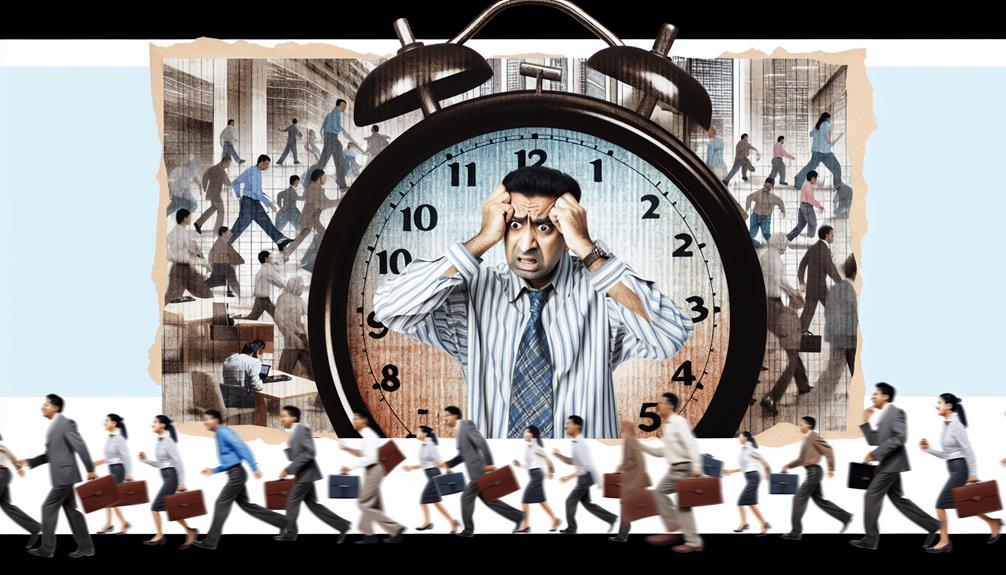Chronic stress can disrupt hormonal balance in men, leading to various symptoms. I often see fatigue and low energy levels, which might indicate hormonal changes. Mood swings and irritability frequently arise due to shifts in cortisol and testosterone. Sleep disturbances are common, contributing to further hormonal imbalances. You might notice muscle weakness and unexpected weight gain as well. Additionally, increased anxiety levels can signal underlying hormonal issues. Recognizing these symptoms is essential for addressing them effectively, and understanding the connection between chronic stress and hormone health opens the door to potential solutions.
Understanding Hormone Imbalance

Hormone imbalance is a complex condition that can greatly affect a man's overall health and well-being. As I explored understanding this topic, I realized that the intricacies of hormonal pathways play a vital role in maintaining ideal endocrine function. Hormones are fundamentally chemical messengers produced by various glands in the endocrine system, and they regulate numerous bodily processes, including metabolism, mood, and reproductive functions.
When these hormonal pathways become disrupted, whether due to lifestyle factors, medical conditions, or environmental influences, the consequences can be extensive. For instance, testosterone, the primary male sex hormone, greatly impacts muscle mass, energy levels, and emotional stability. A decline in testosterone can lead to symptoms such as fatigue, decreased libido, and even mood disorders.
Moreover, the balance between other hormones like cortisol, estrogen, and insulin is equally important. An imbalance in these can exacerbate issues like weight gain, anxiety, and sleep disturbances. Understanding the various hormonal pathways involved and how they interact is critical for recognizing the signs of imbalance.
To address hormone imbalances effectively, one must consider both lifestyle modifications and potential medical interventions. In-depth evaluation by a healthcare professional can help identify the underlying causes and tailor appropriate treatments. By grasping the complexity of hormonal pathways and their role in endocrine function, I've found that men can take proactive steps toward regaining balance and improving their overall health.
The Role of Chronic Stress
Chronic stress wreaks havoc on the body's hormonal balance, leading to a cascade of negative effects that can profoundly impact men's health. When I experience stress, my body activates the stress response, initiating the release of cortisol, a hormone that plays a vital role in managing stress. However, elevated cortisol levels over extended periods can lead to adrenal fatigue, where the adrenal glands become overworked and struggle to produce adequate hormones.
The implications of chronic stress aren't merely short-term; they can result in significant long-term effects on my health. I've noticed that lifestyle factors, like poor diet and lack of exercise, can exacerbate stress and further disturb hormonal balance. These physiological changes can affect not only testosterone production but also overall well-being.
Coping mechanisms become essential in managing stress. Without effective strategies, I find myself caught in a cycle of emotional dysregulation and heightened anxiety. Developing mental resilience is key; by adopting better stress management techniques, I can mitigate the adverse effects of chronic stress. Practices such as mindfulness, regular physical activity, and healthy social connections can help me navigate stressors more effectively.
Ultimately, understanding the role of chronic stress in hormone imbalance is significant. Recognizing its impact allows me to prioritize emotional regulation and implement healthier lifestyle choices, which can lead to improved hormonal health and overall quality of life.
Common Symptoms Overview

When I consider hormone imbalances in men, I often observe both physical health issues and emotional or mental effects that can greatly impact daily life. It's essential to recognize how these symptoms manifest, as they can range from fatigue and weight gain to anxiety and mood swings. Understanding these common symptoms can help identify underlying hormonal changes that may require attention.
Physical Health Issues
Many men may not realize that an imbalance in hormones can lead to a range of physical health issues that manifest in various ways. For instance, changes in body composition, such as increased fat accumulation and reduced muscle mass, are common. These shifts can often be traced back to dietary influences; poor nutrition can exacerbate hormonal imbalances, leading to further physical decline.
Additionally, the benefits of exercise shouldn't be underestimated. Regular physical activity not only aids in weight management but also plays a critical role in regulating hormone levels. On the other hand, neglecting exercise can compound health problems associated with chronic stress.
Stress management through mindfulness practices can also make a significant difference. Techniques such as meditation and deep breathing can help lower cortisol levels, which is essential for maintaining hormonal balance. For some men, hormonal therapies may be necessary to address severe imbalances, but these should always be discussed with a healthcare professional.
Ultimately, making lifestyle changes—like improving diet, increasing physical activity, and incorporating mindfulness—can lead to a more balanced hormonal state and enhance overall physical health.
Emotional and Mental Effects
Although hormone imbalances are often associated with physical health issues, they can also greatly impact emotional and mental well-being. I've noticed that the cognitive effects of hormonal shifts can lead to decreased focus and impaired decision-making. This can severely affect my emotional resilience and overall mental health. With chronic stress, I find my mood regulation becomes erratic, causing unpredictable emotional responses.
Furthermore, these imbalances can diminish my emotional intelligence, making it difficult to navigate social interactions and relationships effectively. Stress management strategies that once worked may no longer be effective, leading to a reliance on inadequate coping mechanisms. I've come to realize that my emotional awareness can become clouded, making it harder to recognize when I'm experiencing stress or anxiety.
Fatigue and Low Energy
Experiencing fatigue and low energy can often be a signal of underlying hormone imbalances in men. I've noticed that when my energy levels drop considerably, it's not just a lack of sleep or a busy schedule; it often points to deeper hormonal issues. Chronic fatigue, for instance, can stem from imbalances in testosterone, cortisol, and other hormones that regulate energy and liveliness.
When I'm under chronic stress, my body may produce excess cortisol, a hormone that, while fundamental in small amounts, can lead to fatigue when levels remain elevated over time. This persistent high cortisol can disrupt the normal functioning of testosterone, leading to reduced energy and increased feelings of tiredness. I've found that low testosterone levels can considerably impact my stamina and overall energy, making even simple tasks feel overwhelming.
Moreover, the interplay of these hormones creates a cycle where fatigue feeds into stress, potentially leading to further imbalances. I've learned to pay attention to these signs; when my energy levels plummet, it's essential to assess my lifestyle, stress management techniques, and hormonal health.
Understanding the relationship between chronic stress and hormone imbalance has been enlightening. It's not just about feeling tired; it's a clear indication that something isn't functioning effectively within my body. Addressing these issues early on can be critical for restoring energy levels and improving overall well-being, allowing me to regain the liveliness I once enjoyed.
Mood Swings and Irritability
I've noticed that mood swings and irritability can often be linked to hormonal imbalances in men. Understanding the emotional fluctuations and identifying specific irritability triggers are essential for addressing these symptoms effectively. In this discussion, I'll share coping strategies that may help manage these challenges.
Emotional Fluctuations Explained
A man's emotional landscape can often be influenced greatly by hormone imbalances, leading to pronounced mood swings and irritability. This phenomenon is closely linked to the body's ability to manage stress and regulate emotions. When hormones like cortisol and testosterone are out of balance, it can disrupt emotional regulation, making it difficult to maintain a stable mood.
In my experience, understanding the role of hormones in emotional fluctuations is essential. Elevated cortisol levels, often a byproduct of chronic stress, can exacerbate feelings of anxiety and irritability. Conversely, low testosterone may contribute to feelings of sadness or lack of motivation, further complicating emotional stability.
Effective stress management techniques become significant in addressing these hormonal imbalances. Incorporating practices such as mindfulness, exercise, and adequate sleep can help mitigate some of the emotional volatility. By proactively managing stress, it's possible to foster a more balanced hormonal environment, which can lead to improved emotional regulation.
Ultimately, recognizing the link between hormone levels and emotional health can empower men to seek appropriate interventions, enhancing both their mental well-being and overall quality of life.
Irritability Triggers Identified
Understanding the connection between emotional fluctuations and hormone levels leads to identifying specific irritability triggers that can exacerbate mood swings. In my journey, I've noticed that certain situations often ignite anger triggers, disproportionately affecting my emotional state. For instance, lack of sleep and excessive caffeine intake can heighten irritability, making it difficult to maintain a balanced mood.
Environmental stressors, like workplace pressure or relationship conflicts, also play a significant role. When I encounter these stressors, I often feel my hormone levels shift, leading to heightened sensitivity and impulsive reactions. Recognizing these patterns is essential for effective stress management.
Moreover, dietary choices can influence my mood. High sugar consumption tends to result in rapid blood sugar fluctuations, which I've found correlate with increased irritability. As a result, I've learned the importance of maintaining a balanced diet rich in whole foods and nutrients.
Coping Strategies for Men
Five effective coping strategies can help men manage mood swings and irritability associated with hormone imbalances. First, incorporating mindfulness practices, such as meditation or deep-breathing exercises, can enhance emotional regulation and promote a sense of calm. Second, establishing regular exercise routines not only boosts mood through endorphin release but also supports overall hormonal balance.
Next, dietary adjustments play an important role. Consuming a balanced diet rich in omega-3 fatty acids, whole grains, and lean proteins can stabilize energy levels and mood. Additionally, building support networks, whether through friends, family, or support groups, can provide an emotional buffer during challenging times.
Stress reduction techniques, such as yoga or tai chi, can be valuable in mitigating the physiological effects of stress. Finally, maintaining sleep hygiene is essential; prioritizing quality sleep can greatly impact hormone levels and mood stability. If necessary, exploring therapy options with a professional can offer tailored strategies for emotional management, providing you with tools to navigate life's challenges effectively. By implementing these strategies, you can proactively address the mood swings and irritability linked to hormone imbalances.
Decreased Libido
How can a decrease in libido signal a potential hormone imbalance in men? When I noticed fluctuations in my libido, it became clear that my testosterone levels might be affected by chronic stress. This isn't just a minor issue; it can lead to significant sexual dysfunction and emotional challenges in relationships. The impact of decreased libido can be far-reaching, affecting not just physical intimacy but also the emotional connection I share with my partner.
Here are some key factors to take into account:
- Libido fluctuations can indicate underlying hormonal issues.
- Testosterone levels are essential for maintaining sexual desire.
- Performance anxiety can exacerbate intimacy challenges.
- Confidence issues often arise from reduced sexual drive.
- Communication barriers can emerge when discussing these concerns.
As my testosterone levels dip, I've found it harder to feel confident and engaged in intimate situations. This can lead to relationship impacts, where my partner may feel rejected or confused. The emotional toll can create further intimacy challenges, making it essential to address these issues.
Lifestyle factors, such as stress management and physical health, can influence hormonal balance and, subsequently, libido. Taking proactive steps—like fostering open communication, seeking support, and exploring potential therapies—can help mitigate these challenges. Recognizing the link between decreased libido and hormone imbalance is vital for restoring not just my sexual health but also the overall quality of my relationships.
Weight Gain and Metabolism Issues

Many men may not realize that unexpected weight gain and metabolism issues can be a direct result of hormone imbalances. When hormones like testosterone and cortisol are out of balance due to chronic stress, it can greatly affect your metabolic rate. I've observed that fluctuations in hormone levels can lead to an increase in caloric intake while simultaneously decreasing the body's ability to burn those calories effectively. This is particularly true when insulin sensitivity declines, making it harder for your body to manage blood sugar levels.
Addressing these issues often requires a multifaceted approach. Implementing stress management techniques can be vital. Additionally, hormone therapy may be beneficial for some men who need to restore hormonal balance. However, lifestyle changes are equally important. Incorporating regular exercise not only aids in improving body composition but also enhances metabolic rate. The exercise benefits are twofold: it helps in weight loss and in improving insulin sensitivity, leading to better weight distribution.
Dietary adjustments can also play a significant role. Eating a balanced diet that considers macronutrient ratios can help stabilize energy levels and optimize metabolic function. It's essential to be mindful of what you consume; this isn't just about cutting calories but about making smart choices that support hormonal health.
Sleep Disturbances
Sleep disturbances often go hand in hand with hormone imbalances, greatly impacting overall health and well-being. As I've navigated my own experiences with stress, I've learned that disrupted sleep can stem from various hormonal fluctuations, particularly those influenced by chronic stress. Poor sleep quality not only affects how I feel during the day but can also exacerbate hormonal issues, creating a vicious cycle.
Understanding the relationship between sleep and hormone regulation is vital. My circadian rhythm, which dictates my sleep-wake cycle, can be thrown off by stress, leading to insomnia or restless nights. To combat this, I've found several strategies useful:
- Prioritizing sleep hygiene: Keeping a consistent sleep schedule and creating an ideal sleep environment.
- Incorporating relaxation techniques: Practices like meditation or deep-breathing exercises help calm my mind before bed.
- Limiting screen time: Reducing exposure to blue light in the evening supports melatonin production.
- Managing stress effectively: Finding ways to alleviate daily stressors has improved my overall sleep quality.
- Monitoring caffeine and alcohol intake: Both substances can disrupt sleep patterns if consumed too close to bedtime.
Muscle Weakness and Loss
Persistent sleep disturbances can contribute to a range of physical issues, including muscle weakness and loss. When I experience chronic stress, my body's hormonal balance can shift, leading to decreased testosterone levels. This hormonal imbalance can trigger muscle atrophy, which is the loss of muscle mass, and it's particularly concerning for those of us who are committed to maintaining our physical health.
As I explore deeper into the effects of hormone imbalance, it becomes clear that the loss of muscle strength can greatly hinder my performance in strength training. Without adequate testosterone, my body struggles to repair and build muscle tissue, making it harder to achieve the gains I aim for in my workouts. This can create a frustrating cycle; the less strength I have, the less motivated I might feel to engage in strength training, which in turn exacerbates muscle loss.
Moreover, when I fail to get enough restorative sleep, my body's ability to recover diminishes. Muscles need time to heal and grow, and without that, I might notice a decline in my overall physical capabilities. This isn't just about aesthetics; it's about maintaining functional strength and energy levels for daily activities.
Understanding the connection between chronic stress, hormone imbalance, and muscle weakness is essential. By addressing the root causes, like sleep issues and stress management, I can work towards regaining my strength and minimizing the effects of muscle atrophy.
Increased Anxiety Levels
In the domain of hormone imbalance, increased anxiety levels can manifest as a notable concern for men. This heightened state of anxiety often stems from the hormonal effects of chronic stress, which can disrupt the delicate balance of cortisol and testosterone. I've noticed that certain anxiety triggers, such as work pressure or personal issues, can exacerbate these feelings, making it essential to identify and manage them effectively.
To navigate this challenge, I've found it helpful to incorporate various strategies into my daily routine. Here are some coping mechanisms that can enhance emotional resilience:
- Mindfulness practices: Engaging in mindfulness can ground me, allowing me to focus on the present moment rather than future worries.
- Relaxation techniques: Simple breathing exercises or progressive muscle relaxation can notably reduce anxiety levels.
- Lifestyle changes: Prioritizing sleep and nutrition contributes to overall well-being, which in turn minimizes anxiety.
- Support systems: Connecting with friends, family, or support groups can provide a crucial outlet for sharing experiences and feelings.
- Therapy options: Consulting a mental health professional can offer personalized strategies for managing stress and anxiety.
Incorporating these elements into my life has improved my ability to cope with anxiety triggers. Stress management isn't just about alleviating symptoms; it's about fostering a lifestyle that promotes balance and well-being. By being proactive, I believe we can better navigate the complexities of hormone imbalance and its associated anxiety.
Seeking Help and Management Strategies

Recognizing when to seek help is essential for effectively managing hormone imbalances in men. The symptoms can be subtle yet debilitating, often leading to increased anxiety or mood swings. I've learned that consulting a healthcare professional is vital to receive an accurate diagnosis and tailored treatment plan. Providers may suggest hormone testing, which can clarify whether imbalances are present and guide subsequent interventions.
In my experience, lifestyle modifications play a significant role in management strategies. Simple changes—like improving sleep quality, engaging in regular physical activity, and maintaining a balanced diet—can have profound effects on hormone levels. I've found that incorporating stress-reduction techniques, such as mindfulness or yoga, helps mitigate the impact of chronic stress on my hormonal health.
Building support networks is equally important. Connecting with others who face similar challenges can provide emotional support and practical advice. Whether it's joining a local support group or discussing issues with friends and family, having a strong network can make the journey easier.
Frequently Asked Questions
How Can Diet Influence Hormone Balance in Stressed Men?
I've found that diet plays a vital role in hormone balance, especially during times of stress. Implementing nutrient timing—eating specific nutrients at ideal times—can enhance hormonal responses. Additionally, effective hydration strategies are essential; dehydration can negatively impact hormone levels. By focusing on a balanced intake of proteins, fats, and carbohydrates, along with staying well-hydrated, I've noticed significant improvements in overall well-being and hormonal health.
Are There Specific Supplements That Help With Hormone Imbalance?
Imagine a garden struggling to thrive under a heavy cloud. Just like that garden, our bodies can benefit from the right nutritional supplements and herbal remedies to restore balance. I've found that supplements like zinc, magnesium, and vitamin D can play an essential role in hormone regulation. Herbal remedies such as ashwagandha and maca root also show promise. These tools can help nurture our hormonal garden back to health, promoting overall well-being.
Can Exercise Reverse Hormone Imbalance Caused by Stress?
I've found that exercise can greatly help reverse hormone imbalances caused by stress. The benefits of exercise go beyond just physical health; it promotes stress relief, which is essential for hormonal balance. Engaging in regular physical activity boosts endorphins, reduces cortisol levels, and enhances overall mood. Personally, incorporating exercise into my routine has led to noticeable improvements in my energy levels and emotional well-being, making it a powerful tool for managing stress-related hormone issues.
What Role Does Sleep Quality Play in Hormone Regulation?
Sleep quality plays an essential role in hormone regulation. I've noticed that sleep deprivation can lead to significant hormonal fluctuations, impacting everything from cortisol levels to testosterone production. When I prioritize quality sleep, I find my hormones stabilize and my overall well-being improves. By understanding the connection between restful sleep and hormone balance, I can better manage my health and mitigate the effects of stress on my body.
How Quickly Can Symptoms Improve With Stress Management Techniques?
When it comes to stress management, it's often said that a stitch in time saves nine. I've found that symptoms can improve considerably within a few weeks of incorporating mindfulness practices and relaxation techniques into my routine. By focusing on deep breathing and meditation, I noticed a reduction in anxiety levels and an overall sense of calm. Everyone's experience varies, but consistency is key to feeling better and regaining balance.
